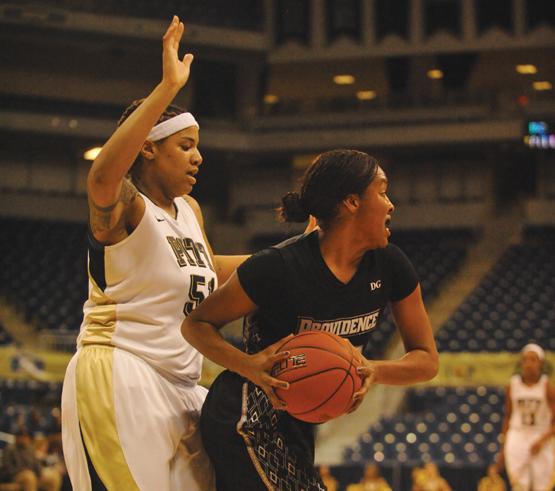Women’s Basketball: Pitt adjusts to rule changes that keep close eye on physical play

November 5, 2013
Marvadene “Bubbles” Anderson received an entry pass as she posted her 6-foot-11-inch frame against fellow Pitt forward Cora McManus.
She turned and started toward the hoop, hoping to lay the ball in with relative ease, as is customary for the tallest women’s basketball player in Division I. But before she could finish converting the layup, a whistle blew.
The play was blown dead, but not by a referee. Rather, head coach Suzie McConnell-Serio blew the whistle in the middle of the intrasquad scrimmage to charge a personal foul to McManus, who attempted to neutralize Anderson’s forceful motion off-track with a subtle body nudge.
McConnell-Serio and her staff have served as practice-squad refs to help the Panthers adjust to 32 rule changes implemented by the NCAA this summer, most of which prioritized controlling the game’s physicality.
If Pitt’s exhibition last Sunday was any indication of the degree to which officials will enforce the new set of rules, the Panthers and the rest of the NCAA are in for high-scoring games with plenty of fouls and free-throw attempts.
A combined 56 infractions were called Sunday, a significant increase from last season when the Panthers and their opponents combined for an average of 32 fouls per game. Pitt converted 70.6 percent (24-34) of its free throw attempts in the game, five percentage points higher than the team average last season.
The players have taken note of how the new rules might affect their play.
“I think it changes the element of the game a little bit,” redshirt senior guard Ashlee Anderson said of the officiating changes. “We have been working on [adapting], and our coaches have been harping on not putting our hands [on offensive players] in practice and trying to not be overly aggressive on the ball.”
Even though Pitt has played only one game, a 97-67 exhibition victory over California University of Pennsylvania on Sunday, the changes in the flow of the game and officiating were clear.
McConnell-Serio admitted that the transition is a work in progress for her team.
“It has been tough,” she said. “Looking at some box scores of exhibition games, there have been games with 30-some, 40-some free throws taken.”
With 12 minutes remaining in the first half Sunday, the Panthers had already entered the double bonus, which granted them two free throws for each foul for the remainder of the half.
McConnell-Serio said it is mostly up to the players to learn the tendencies of the officials, saying, “I think it’ll be an adjustment by our players.”
She added that stopping the momentum of offensive players — especially slowing down ball handlers by using the forearm — will no longer be tolerated.
“I think that is the biggest thing that we have to get adjusted to [is] getting a feel for the personnel you are playing against, their speed and quickness and making adjustments in that regard,” McConnell-Serio said.
In a prepared statement on officiating, the Women’s College Basketball Officiating Board of Managers said, “The state of women’s basketball is at a critical juncture, and we have an opportunity to move the needle in a positive way to improve the game through officiating.”
At officiating clinics this offseason, the Board emphasized consistency in regular-season and postseason play.
“We fully recognize that there is an expectation that more fouls will be called and coaches and players will need to adapt,” the Board continued. “We are united on the concepts we want to see emphasized on the court, and this is a tremendous opportunity we cannot afford to miss.”
The change was most evident Sunday on the perimeter for Pitt, where junior guard Brianna Kiesel — typically an aggressive defender on and off the ball — struggled to adjust to the new rules and was the only Pitt player to foul out.
“Brianna Kiesel ended up having a tough game defensively just trying to make plays,” McConnell-Serio said. “[There were] some tough calls against her where she fouled out. I was kind of hoping she would be able to get into a flow [in] our first game together.”
Kiesel and the Panthers are set to take on Bucknell at home Friday, which will be McConnell-Serio’s first regular-season game as Pitt’s head coach.
Although the transition has just begun for Pitt players and coaches, Sunday’s exhibition game left Anderson feeling that the Panthers will benefit from the rule changes once players adjust and the game opens up for offensive players to perform.
“I feel like it will work in our favor just because we trust each other,” Anderson said. “If you are going to be aggressive, you know that your teammates are going to have your help.”


